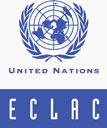Senior government officials shared their perspectives on sustainable development priorities in the Caribbean, during the 26th session of the Caribbean Development and Cooperation Committee (CDCC), a subsidiary body of the UN Economic Commission for Latin America and the Caribbean (ECLAC).
Among other priorities, participants stressed national ownership and integrated planning, and suggested addressing debt management through a Caribbean Resilience Fund.
 22 April 2016: Senior government officials shared their perspectives on sustainable development priorities in the Caribbean, during the 26th session of the Caribbean Development and Cooperation Committee (CDCC), a subsidiary body of the UN Economic Commission for Latin America and the Caribbean (ECLAC). Among other priorities, participants stressed national ownership and integrated planning, and suggested addressing debt management through a Caribbean Resilience Fund.
22 April 2016: Senior government officials shared their perspectives on sustainable development priorities in the Caribbean, during the 26th session of the Caribbean Development and Cooperation Committee (CDCC), a subsidiary body of the UN Economic Commission for Latin America and the Caribbean (ECLAC). Among other priorities, participants stressed national ownership and integrated planning, and suggested addressing debt management through a Caribbean Resilience Fund.
Opening the meeting, Antonio Prado, ECLAC, said the challenge facing the Caribbean is to “identify paths to development that emphasize macroeconomic stability with growth, equity and environmental sustainability.” Developing such paths, he said, “will provide a bulwark against external shocks and the protection necessary for those that are most vulnerable.”
On implementing the 2030 Agenda for Sustainable Development, Diane Quarless, Director of ECLAC Subregional headquarters for the Caribbean, stressed the importance of “national ownership, strong integrated policy planning and effective institutional coordinating mechanisms” to foster partnerships and enhance programme implementation. In light of the Caribbean’s specific challenges, she stressed the need to balance sustainable development with structural adjustments, to improve productivity in all sectors, and to harness the region’s creative industries to maximize economic returns.
On debt, Antigua and Barbuda’s Minister of Foreign Affairs, International Trade and Immigration, Charles Fernandez, presented a synthesis of discussions from the fourth Caribbean Development Roundtable (CDR). He highlighted the importance of addressing debt obligations while promoting sustainable development, proposing options for more effective debt management that harnesses green industries to promote economic transformation and growth. During the CDR, he said, ECLAC called for a Caribbean Resilience Fund that would use pledged climate funds from the Green Climate Fund (GCF) to write down the public debt of Caribbean countries, particularly small island developing States (SIDS), and create financing for adaptation and mitigation initiatives and green economies.
Participants also discussed disaster assessment and resilience-building programs and improvements in the Damage and Loss Assessment (DaLA) methodology, and the effects of the aging of the Caribbean population, including increased demand on social protection and health systems.
The session convened in Basseterre, Saint Kitts and Nevis, on 22 April 2016. The CDCC subregional office serves 26 countries in the wider Caribbean. [ECLAC Press Release, 21 April] [ECLAC Press Release, 22 April]